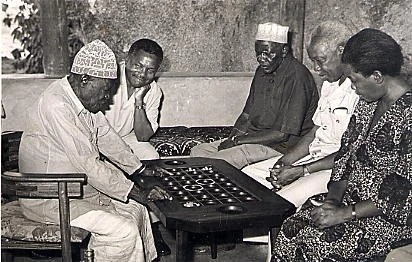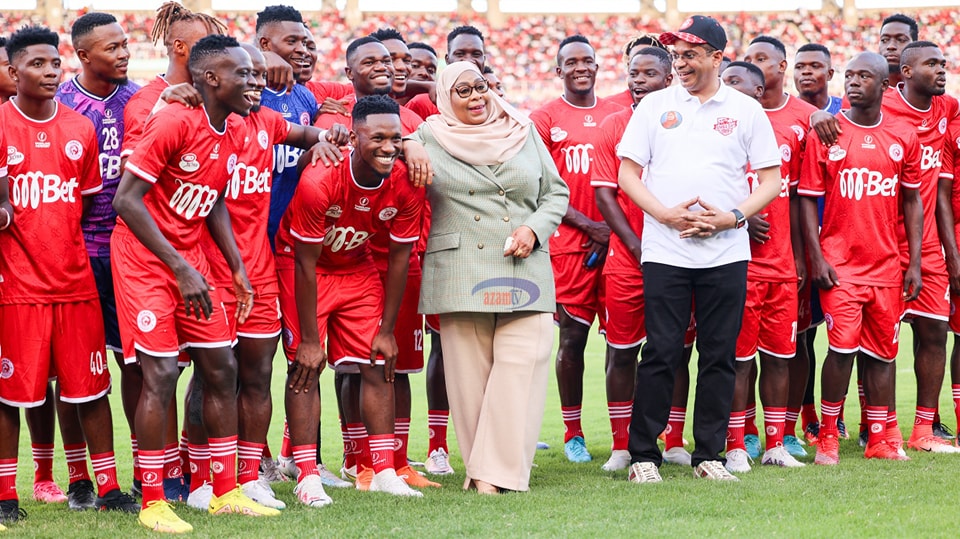A few weeks ago, Simba Sports Club celebrated their Club Hive-ous Day, an annual event that takes place at the peak of the Simba Day week. It is a week-long celebration involving community engagement, charity work, and the active involvement of Simba fans with their club, attended by different political leaders where the Guest of honor was the President of the United Republic of Tanzania, Dr. Samia Suluhu Hassan. While this practice has long been a tradition for their rivals, Young Africans, and other clubs, the event’s peak is marked by friendly games between various teams, including the U-17 and female teams and the male first team. Still, my mind was left with a question, Are there Interdependent Allies or Distant Relations between Sports and Politics in Tanzania?
These teams compete against invited counterparts from within and outside the country to celebrate the day and bring their fans joy. This celebration, unique to the esteemed and established teams like Young Africans and Simba Sports Club, bears an extra dimension. It encompasses the presence of high-ranking officials from the country as honored guests.
Beyond evaluating the number and quality of foreign players, fan attendance, and other factors, the political figure who graces the event becomes another measure of competition. However, beyond the sporting aspect of these festivities lies the intriguing convergence of politics and the sports/entertainment sector in Tanzania. This phenomenon has been growing over the years and has become inseparable from each other.
Politics and Play: Tanzania’s Interwoven Legacy of Sports, Entertainment, and Governance
Tanzania, as a nation, is renowned for various attributes, including its tourist attractions, populace, distinctive language, politics, and culinary diversity. Politically, Tanzania’s strong Pan-Africanism legacy cannot be overlooked. The nation was pivotal in liberating numerous African countries, advocating for African Unity and Socialism.
On the political front, Tanzania is one of the few countries globally where the ruling party has maintained its position since independence, alongside countries like Botswana, Mozambique, Namibia, South Africa, and Zimbabwe. Historically, the struggle for independence in Tanzania is intertwined with entertainment.
It’s believed that due to strict gathering regulations during the pre-independence era, freedom fighters led by Mwl. Julius Kambarage Nyerere utilized music festivals and sports as means of communication and planning for liberation from British rule. Even post-independence, sports and entertainment continued to foster unity, as seen in games like the traditional mancala board game, “Bao,” which remains widespread among older generations.

Both politics and sports share a typical trait of engagement with the population. While political parties have followers, sports have fans. In Tanzania’s case, where the ruling party, Chama cha Mapinduzi, has held power for years, the party’s influence on the sports and entertainment sector is undeniable. The same applies to the opposition, where key figures in the entertainment industry align themselves with parties, influencing supporters during election campaigns. This trend is increasingly prominent, prompting a more in-depth exploration of the profound connection between the sports and entertainment sector and the realm of politics.
From the government’s standpoint, the victorious political party in Tanzania’s national elections wields substantial regulatory control. This control extends to the sports and entertainment sector as well. Regulatory bodies such as BMT (Baraza la Michezo Tanzania) and BASATA (Baraza la Sanaa Tanzania), under the ministry responsible for sports, traditions, and games, oversee sports and arts development within the country. This signifies a regulatory framework that inherently aligns the industry, both directly and indirectly, with those in power—an alignment that differs from other countries.
Indirectly, while most political fans are also football fans and entertainment fanatics, they exert their influence and power to influence outcomes in the industry with their positions in office. This dynamic illustrates how the government’s influence permeates the industry from a regulatory and influence perspective. This influence becomes particularly evident in conflict resolution, contract disputes officially and unofficially, and even in matters of authority, as was recently seen in the case of Feisal Salum “Fei Toto” and his involvement with his club, Young Africans. In turn, the environment coerces football clubs and other actors in the entertainment sector to adhere even when the statements provided are not in favor of the decision they have to make.
Simultaneously, the sports and entertainment industry has become a pivotal political messaging and influence tool. Given its extensive following comprising millions of supporters and fans, the industry offers a potential means to disseminate impactful messages to the masses, often aligning with the interests of those in power. Notably, high-profile politicians have been invited as guests of honor, delivering speeches during sporting events, as seen in the case of Simba Day, but also the invitation of Young Africans in Zanzibar and Malawi.
Furthermore, fans proudly adorn merchandise with images of key government figures, displaying their support and appreciation for the government’s developmental efforts that benefit the citizenry. This dynamism is further evident in the realm of arts, where artists compose songs that laud achievements, offer critique, and celebrate accomplishments. These songs, widely broadcasted and aired nationwide, reach a vast listenership through social media and other media channels.
Politics & Sports in Tanzania: Benefits, Risks, and the Need for Balance
This unparalleled medium of influence becomes particularly potent in a nation where more than 50% of the population comprises youth and in an era boasting over 30% internet connectivity and more than 75% media coverage. The convergence of politics, sports, and entertainment facilitates a symbiotic relationship wherein the government harnesses the industry’s pervasive reach for political gain. In contrast, the industry gains visibility and support in return.
The intertwining relationship between football clubs and political parties can yield positive and negative outcomes. From the Tanzanian context, the brighter side can be associated with citizens’ sense of unity and national pride. When football clubs or other vital actors in the entertainment industry align with political parties, they can become platforms for promoting social causes, community development, and even national agendas.
By leveraging their influence and amplifying essential messages, such as unity, diversity, and progress, resonating deeply with fans and citizens alike can be desirable. Nevertheless, this partnership can potentially boost financial support and infrastructure development for clubs, enabling them to improve the industry’s performance, which is potentially considered an avenue to help combat unemployment in the country. When handled transparently and responsibly, this could create a positive synergy that benefits society as a whole. However, this relationship can also lead to detrimental consequences.
The politicization of the sports and entertainment industry could be a reason for divisions among fans along political lines, undermining the unifying power of sports and shying away from investors who wish to be involved in national politics. When clubs become associated exclusively with certain parties, they risk alienating segments of their fan base who do not share those political beliefs. Additionally, undue political interference can compromise the autonomy of clubs, impeding fair competition and decision-making, which is against FIFA rules. In extreme cases, political manipulation could hinder the growth of the sports industry, stifling talent development and international competitiveness.
This being the case, while a balanced collaboration between sports clubs and other key actors in the entertainment sector and political parties can be advantageous, it’s crucial to strike a careful equilibrium that preserves the integrity of the sport and entertainment, maintains fan unity, and avoids detrimental political influences.

